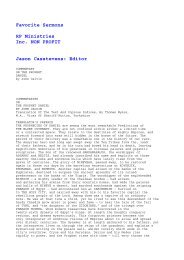Lamentations - The Sermon Depository
Lamentations - The Sermon Depository
Lamentations - The Sermon Depository
Create successful ePaper yourself
Turn your PDF publications into a flip-book with our unique Google optimized e-Paper software.
een broken down as though they were melted. And then the Prophet<br />
seems to allude to the previous hardness of the people, for their hearts had<br />
been extremely stupified. As, then, they never had been flexible, whether<br />
addressed by doctrine, or exhortations, or threatenings, he now by<br />
implication brings forward in contrast with them the walls of the city, as<br />
though he had said, “Hitherto no one of God’s servants could draw even<br />
one tear from your eyes, so great was your hardness; but now the very<br />
walls weep, for they dissolve, as though they would send forth rivers of<br />
waters. <strong>The</strong>refore the very stones turn to tears, because ye have hitherto<br />
been hardened against God and all prophetic instruction.”<br />
He afterwards adds, Spare not thyself, give not thyself rest day or night,<br />
and let not the daughter of thine eye, or the pupil of thine eye, cease,<br />
literally, be silent; but to be silent is metaphorically taken in the sense of<br />
ceasing or resting. He intimates that there would be, nay, that there was<br />
now, an occasion of continual lamentation; and hence he exhorted them to<br />
weep day and night; as though he had said, that sorrow would continue<br />
without intermission, as there would be no relaxation as to their evils. But<br />
we must bear in mind what we have before said, that the Prophet did not<br />
speak thus to embitter the sorrow of the people. We indeed know that the<br />
minds of men are very tender and delicate while under evils, and then that<br />
they rush headlong into impatience; but as they were not as yet led to true<br />
repentance, he sets before them the punishment which God had inflicted,<br />
that they might thereby be turned to consider their own sins. It follows, —<br />
<strong>Lamentations</strong> 2:19<br />
19. Arise, cry out in the night;<br />
in the beginning of the watches<br />
pour out thine heart like water<br />
before the face of the Lord: lift<br />
up thy hands toward him for<br />
the life of thy young children,<br />
that faint for hunger in the top<br />
of every street.<br />
19. Surge, Clama nocte principio<br />
excubiarum (custodiarum ad verbum,<br />
sed significat vigilias nocturnas;) effunde<br />
tanquam aquas cor tuum coram facie<br />
Domini; attolle ad ipsum manus tuas<br />
propter Animam parvulorum tuorum,<br />
qui deficiunt fame in capite omnium<br />
compitorum.<br />
<strong>The</strong> Prophet now explains himself more clearly, and confirms what I have<br />
lately said, that he mentioned not the calamities of the people except for<br />
this end, that those who were almost stupid might begin to raise up their<br />
eyes to God, and also to examine their life, and willingly to condemn<br />
themselves, that thus they might escape from the wrath of God.<br />
<strong>The</strong> Prophet then bids them to rise and to cry. Doubtless they had been by<br />
force constrained by their enemies to undertake a long journey: why then<br />
does he bid them to rise, who had become fugitives from their own<br />
country, and had been driven away like sheep? He regards, as I have said,<br />
the slothfulness of their minds, because they were still lying torpid in their<br />
sins. It was then necessary to rouse them from this insensibility; and this<br />
is what the Prophet had in view by saying, Rise. F48 And then he bids them<br />
to cry at the beginning of the watches, even when sleep begins to creep on,<br />
and the time is quieter; for when men go to bed, then sleep comes on, and<br />
that is the main rest. ut the Prophet bids here the Jews to cry, and in their<br />
uneasiness to utter their complaints at the very time when others take their<br />
rest. et he did not wish them heedlessly to pour forth into the air their<br />
wailings, but bade them to present their prayers to God. hen as to the<br />
circumstances of that time, he repeats what we have already seen, that so<br />
great was their mass of evils, that it allowed the people no relaxation; in<br />
short, he intimates that it was a continual sorrow.<br />
But, as I have said, he would have the Jews not simply to cry, but after<br />
having exhorted them to pour out their hearts like waters, he adds, before



